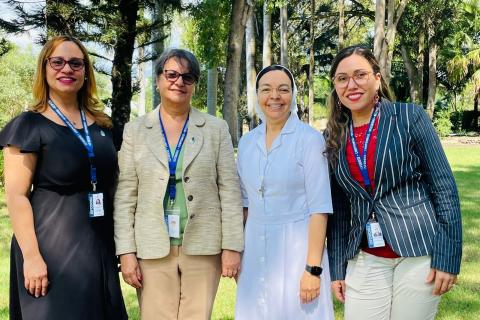
Salesian Sr. Ana Julia Suriel Sánchez during the Ibero American conference of university presidents on the 10th anniversary of Laudato Si', held from May 20 to 25 in Rio de Janeiro, Brazil. (Luis Donaldo González)
In a rare role for a woman religious in higher education, Salesian Sr. Ana Julia Suriel Sánchez oversees one campus of the Dominican Republic’s sole public university dedicated to training educators.
"I am working in a public institution because the Dominican government believes in education based on Christian humanism," Suriel Sánchez told Global Sisters Report during the Ibero American conference of university presidents on the 10th anniversary of Laudato Si', held in late May at the Pontifical Catholic University of Rio de Janeiro, Brazil.
"At this campus, we [Salesian sisters] have the freedom to educate based on our teaching methods and our vision," Suriel Sánchez said. "Within the framework of the institution's regulations, we implement and offer training that holistically forms college students."
As executive vice president of the Emilio Prud’Homme campus of the Instituto Superior de Formación Docente Salomé Ureña (ISFODOSU), she leads the formation of teachers who will in turn shape the next generations of citizens in her country.
There are eight Catholic universities in the Dominican Republic. However, since 1989, the national government has handed over the management of this campus to the Daughters of Mary Help of Christians, Suriel Sánchez's religious congregation.
"I am working there where my country's educational policies are made," Suriel Sánchez said.
"I seek to ensure that our educational programs are grounded in Christian humanism. This includes values such as justice, service and academic rigor." —Sr. Ana Julia Suriel Sánchez

Salesian Sr. Ana Julia Suriel Sánchez (center), along with peer university presidents or representatives, during the synodal conversations at the Ibero American conference of university presidents on the tenth anniversary of Laudato Si'. (Luis Donaldo González)
In addition to her role as university vice president, Suriel Sánchez serves as the representative of Catholic education to the country's Ministry of Education. She is also the president of the National Union of Catholic Schools, which includes almost 400 Catholic schools in the Caribbean country.
"Catholic education in Latin America is facing a challenging time," Suriel Sánchez said. "New economic, political, social and educational paradigms are questioning the value of life, the right to religious freedom and the value of truth."
"Higher education is committed to educating new generations with a deep awareness of the major realities of the Latin American context: poverty, inequality, exclusion, diversity in all its forms and multiple forms of vulnerability, including forced migration," she added.
Since Pope Francis launched the Global Compact on Education (GCE) in 2019, which aims to foster universal solidarity and mutual understanding between younger and older generations through education, Suriel Sánchez has been actively working on its implementation in her home country and throughout Latin America.
"Following the GCE, we are promoting spaces for reflection, pedagogical action, and shared evaluation of achievements, challenges, and learning experiences," she said. "This compact is a way to gift future generations a more humane, empathetic, and livable world, both ecologically and socially."
As one of 230 university presidents attending the conference in Río, Suriel Sánchez said that colleges and universities from different countries must be able to create networks between themselves. "Higher education cannot survive in isolation," she said. "It is necessary to build bridges between universities."
Suriel Sánchez spoke with GSR and reflected on her ministry, the state of higher education in Latin America, and the mission of Catholic universities amid shifting cultural and political contexts.
Advertisement
GSR: How would you define your ministry in favor of higher education?
Suriel Sánchez: My ministry is to exercise leadership that focuses on the holistic education of young people. This means training professionals — in my case, educators –—who serve not only economic systems, but also societies.
As a university vice president, I seek to ensure that our educational programs are grounded in Christian humanism. This includes values such as justice, service and academic rigor. At the same time, as a religious sister, I am very attentive to the needs of young people and those who work on my campus. There, we not only discuss academic or administrative issues, but also essential life issues.
My mission is to help students find meaning in their lives and vocations. Beyond helping students to finish their programs and then get good jobs, my ministry focuses on developing people capable of transforming society.
What are the challenges for higher education in Latin America?
There is currently a general educational deficit in Latin America. According to the World Bank, more than 50% of the 10-year-old Latin American students cannot read or understand a simple text. This is known as learning poverty.
In higher education, we see inequality, low investment and limited coordination between academic training and the real exigencies of the labor market or contemporary social challenges. In addition, many Latin American universities lack robust evaluation and quality assurance systems. These situations create a notable difference between university graduates worldwide and those from Latin America. According to the Organisation for Economic Co-operation and Development, Latin American professionals face greater difficulties in entering global labor markets due to deficits in technical, digital, linguistic and critical thinking skills.
Unfortunately, one of the main challenges for higher education in Latin America is also responding to rapid social changes, migratory dynamics, and the new needs emerging from generations of young people influenced by technology and digital culture.
Although significant progress has been made in many countries, the region still faces structural problems that require a profound transformation of the education system with an inclusive, sustainable and equity-centered vision.

In February, Dr. Nurys del Carmen González, the President of Instituto Superior de Formación Docente Salomé Ureña, visited the Emilio Prud’Homme campus, led by Sr. Ana Julia Suriel Sánchez, executive vice president and head of the campus. From left to right: Yenny Alt. Rosario, academic affairs director; Del Carmen González; Sr. Suriel Sánchez; Mary De León Hernández, administrative and economic affairs director. (Courtesy of Ana Julia Suriel Sánchez)
How can the university impact social justice and caring for the common home?
The university world must be an agent of social transformation and a promoter of the common good. In its academic role, the university researches, analyzes and proposes scientific solutions to social problems. However, those efforts only achieve their true meaning when they are translated into concrete actions that benefit real communities.
On my campus, we implement programs of "research and action." Those are key strategies for connecting the students with our social and environmental issues. We train future teachers and educators to develop a critical, analytical and reflective perspective. We also train them to be able to intervene proactively in their contexts.
Under this vision, universities can become a bridge between knowledge and social transformation, contributing to a more just and sustainable society.




